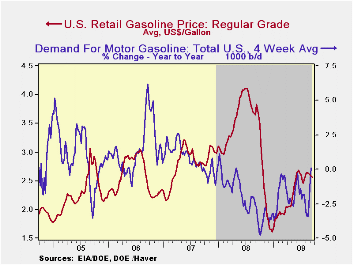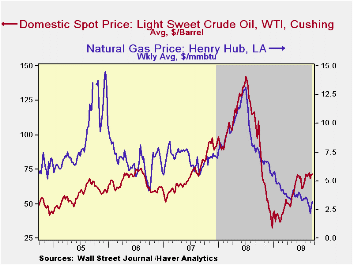 Global| Sep 22 2009
Global| Sep 22 2009Weekly Gasoline Prices Slip Just Modestly As Trend Remains Firm
by:Tom Moeller
|in:Economy in Brief
Summary
Since June, improvement in the U.S. economy and aggressive measures by the Federal Reserve to stimulate growth have supported gasoline prices from their lows of last December. However, any incremental strength in prices has topped [...]

Since June, improvement in the U.S. economy and aggressive measures by the Federal Reserve to stimulate growth have supported gasoline prices from their lows of last December. However, any incremental strength in prices has topped out. The pump price for regular gasoline dipped slightly last week to an average $2.55 per gallon, roughly where it's been since early June. These prices compare to the December low of $1.61. Yesterday, prices backpedaled even further as speculation mounted that the Fed may soon rein in its simulative policies. The wholesale gasoline price fell to $1.76 per gallon. Prices had reached a high in early-August of $2.03. The figures are reported by the U.S. Department of Energy and can be found in Haver's WEEKLY & DAILY databases.
During August, the consumer price index for gasoline recouped
the July decline with a not seasonally adjusted 3.3% increase.
Seasonally adjusted gas prices were quite firm and rose 9.1% m/m, up
40.3% YTD.
Crude oil prices have followed a similar pattern. Light sweet crude oil prices (WTI) held last week near the high at $71.36 per barrel, up from the December low of $32.37. Yesterday, however, the spot market price for light sweet crude oil fell to $69.71 per barrel versus a daily high of $72.51 last week.
Earlier strength in gasoline prices reflected incremental improvement in the demand for gasoline. Seasonal factors accounted for much of demand's incremental improvement, but in September demand has remained firm. The y/y uptick of 0.1% is the first positive comparison since early-2008. Demand for residual fuel oil also has improved. It shows a positive 8.6% y/y comparison but distillate demand is off 14.9% y/y). Finally, oil remains plentiful as evidenced by a 13.5% y/y rise in inventories of crude oil & petroleum products. Inventories of gasoline recently have dropped somewhat but they have strengthened by 12.5% versus last year, the strongest gain in ten years. The figures on crude oil production and inventories are available in Haver's OILWKLY database.
Natural gas prices continued to be the weakest part of the energy sector's pricing environment. Though they increased last week to an average of $3.22 per mmbtu (-59.3% y/y), they remained down by three-quarters from the high reached in early-July of last year of $13.19/mmbtu. Yesterday prices held at the $3.38 level.
Predicting Crises, Part I: Do Coming Crises Cast Their Shadows Before? from the Federal Reserve Bank of San Francisco can be found here.
| Weekly Prices | 09/21/09 | 09/14/09 | Y/Y | 2008 | 2007 | 2006 |
|---|---|---|---|---|---|---|
| Retail Regular Gasoline ($ per Gallon, Regular) | 2.55 | 2.58 | -31.4% | 3.25 | 2.80 | 2.57 |
| Light Sweet Crude Oil, WTI ($ per bbl.) | 71.36 | 70.91 | -26.7% | 100.16 | 72.25 | 66.12 |
Tom Moeller
AuthorMore in Author Profile »Prior to joining Haver Analytics in 2000, Mr. Moeller worked as the Economist at Chancellor Capital Management from 1985 to 1999. There, he developed comprehensive economic forecasts and interpreted economic data for equity and fixed income portfolio managers. Also at Chancellor, Mr. Moeller worked as an equity analyst and was responsible for researching and rating companies in the economically sensitive automobile and housing industries for investment in Chancellor’s equity portfolio. Prior to joining Chancellor, Mr. Moeller was an Economist at Citibank from 1979 to 1984. He also analyzed pricing behavior in the metals industry for the Council on Wage and Price Stability in Washington, D.C. In 1999, Mr. Moeller received the award for most accurate forecast from the Forecasters' Club of New York. From 1990 to 1992 he was President of the New York Association for Business Economists. Mr. Moeller earned an M.B.A. in Finance from Fordham University, where he graduated in 1987. He holds a Bachelor of Arts in Economics from George Washington University.
More Economy in Brief
 Global| Feb 05 2026
Global| Feb 05 2026Charts of the Week: Balanced Policy, Resilient Data and AI Narratives
by:Andrew Cates






